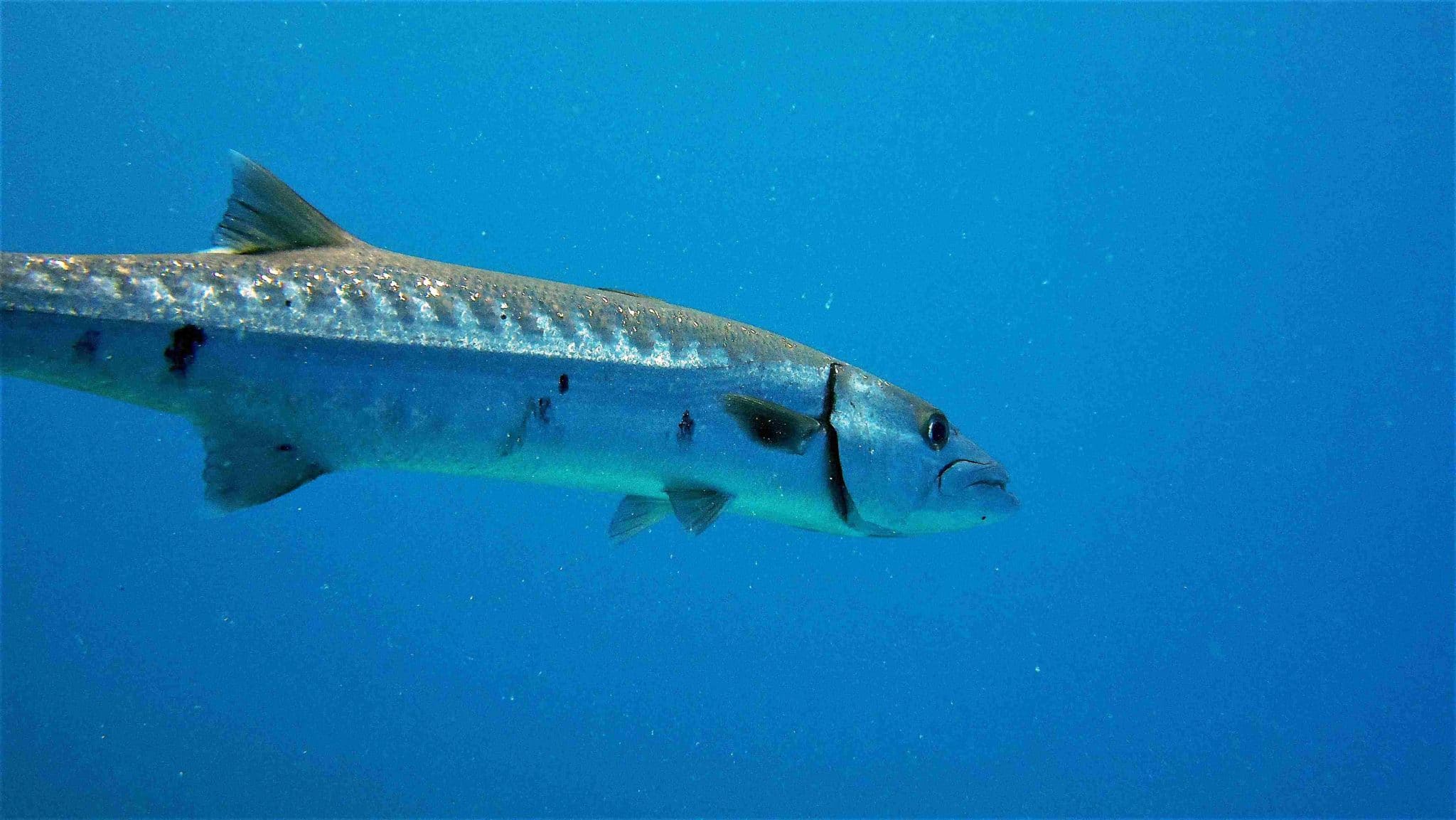Barracuda is a predatory fish that has long been known for its scary appearance with a sleek, silvery physique, keen eyesight and mouthful of razor-sharp teeth. They are a popular game fish, mostly caught by anglers for the purpose of sport because of their large size and acrobatic fighting ability.
[ninja_tables id=”68098″]
Most anglers describe this fish as being quite aggressive, and if you have one hooked on your fishing line, be prepared because it will definitely put up a good fight just to prevent itself from being captured or reeled in. They are absolutely a fun game fish to catch.
However, If you’ve caught one successfully, you might be asking yourself, can you eat barracuda? Is it safe? And what does it taste like? Fear not, dear reader! In this article, we are going to unravel these questions and more. We will also discuss with you how to prepare and cook barracuda if it’s indeed safe to eat. Stay tuned!
What Is a Barracuda?
Barracudas are indeed formidable saltwater creatures known for their sleek bodies and razor-sharp teeth. These fish belong to the Sphyraenidae family and are found in tropical and subtropical waters around the world.
They are highly recognizable due to their elongated bodies, pointed snouts, and large mouths filled with rows of sharp teeth which they use to feed on preys like snappers, groupers, small tunas and herrings.
Barracudas can grow quite large, with some species reaching lengths of up to 6 feet! They are incredibly fast swimmers, capable of reaching speeds up to 36 miles per hour. They are most commonly found near the coast, on coral reefs, or around shipwrecks.
Despite their fearsome reputation as apex predators, many people wonder if they can eat barracuda. Well, read on to find out!
Can You Eat Barracuda?
Many people wonder if they can eat barracuda, considering its fierce reputation as a predator. Well, the answer might surprise you! Barracuda is indeed edible and has been consumed by many cultures around the world for centuries.
However, it’s important to be aware of some potential health risks associated with consuming barracuda fish. Barracudas are known to contain levels of ciguatera toxin and mercury contamination which can cause food poisoning and other potential health risks in humans if consumed in large amounts (more on this below).
To minimize these risks and ensure your safety when consuming barracuda meat, it is recommended to limit your intake of barracuda, avoid larger barracudas and focus on smaller ones instead. Also, purchase from reputable sources, cook thoroughly, refrigerate properly, and consume within a reasonable time frame.
What Does Barracuda Taste Like?
When it comes to the taste of barracuda, opinions can vary greatly. Some describe its flavour as mild and sweet, while others find it to have a slightly stronger and more distinct fish flavour. It all depends on personal preferences and how the fish is prepared.
The flesh of barracuda is firm, white, and flaky when cooked. Its texture is often compared to that of grouper or snapper. Many people enjoy the meaty texture and rich flavours that barracuda has to offer.
One factor that can influence the taste is the size of the fish. Smaller barracudas tend to have a milder flavour, while larger ones may have a more pronounced taste. Additionally, how fresh the fish is also plays a role in its overall flavour profile.
To enhance the natural flavours of barracuda, many chefs recommend marinating it beforehand with citrus juices or herbs like thyme or cilantro. This helps tenderize the meat and adds additional layers of flavour.
What Toxin Is Found in Barracuda?
While it may be tempting to indulge in this sleek and powerful creature, there are certain factors to consider before taking a bite. One such factor is the presence of toxins in barracuda meat.
One toxin commonly found in barracuda is ciguatera toxin. This potent neurotoxin originates from microscopic algae that grow on coral reefs, which are common habitats for barracudas. Ciguatera toxin can accumulate in the flesh of these fish, especially larger ones that have had more time to consume contaminated prey.
Consuming barracuda contaminated with ciguatoxin can lead to a condition called Ciguatera Fish Poisoning (CFP). Symptoms vary but often include gastrointestinal issues like nausea, vomiting, and diarrhea. Additionally, neurological symptoms such as numbness or tingling sensations may occur.
It’s important to note that not all barracudas carry high levels of ciguatera toxin. However, due to the unpredictable nature of toxin accumulation, it’s challenging to determine if a particular fish is safe for consumption without proper testing.
To minimize the risk of consuming toxic barracuda meat, it’s advisable to follow local fishing regulations and guidelines regarding size limits and recommended consumption practices.
Is Barracuda High in Mercury?
When it comes to consuming saltwater fishes generally, one of the major concerns that often arises is the level of mercury present in certain species. And barracuda is no exception.
Mercury is a naturally occurring element that can be found in water bodies and can accumulate in fish over time. This heavy metal can have detrimental effects on human health if consumed in large quantities.
Unfortunately, barracuda tends to be high on the list of fish species with elevated levels of mercury. Due to its predatory nature and long lifespan, this sleek predator has higher chances of accumulating mercury as it consumes smaller fish throughout its life.
It’s important to note that pregnant women, nursing mothers and young children are particularly susceptible to the harmful effects of mercury. Therefore, it is recommended to limit consumption of barracuda and other similar predatory fish known for their high mercury content.

What Size of a Barracuda is Safe to Eat?
When it comes to enjoying barracuda as a meal, size does matter. The general rule of thumb is that smaller barracudas are safer to eat than their larger counterparts. This is because larger barracudas tend to have higher levels of mercury and other toxins in their flesh.
But what exactly qualifies as a “safe” size? Well, it’s recommended to stick with barracudas that are less than three feet long or weigh less than 10 pounds. These smaller specimens are typically younger and haven’t had as much time to accumulate harmful substances in their bodies.
Another important factor to consider when determining the safety of eating barracuda is where it was caught. Barracudas caught in polluted waters or near industrial areas may have higher levels of contaminants, regardless of their size.
So, if you’re thinking about catching your own barracuda for dinner, make sure you adhere to these guidelines for a safer dining experience.
Can You Eat Barracuda Raw?
Raw fish has gained popularity over the years, with sushi, ceviche and sashimi becoming beloved culinary choices. But can you eat barracuda raw?
While some people do consume barracuda in its raw form, it is generally advised against doing so due to ciguatera toxin and elevated mercury levels found within this predatory fish species.
To protect your health and enjoy this tasty seafood option safely, it is recommended to cook the fish thoroughly before consuming it. Cooking at a high temperature of about 145°C helps destroy any harmful bacteria or toxins present in the flesh.
Nutritional Value and Health Benefits of Barracuda Meat
Barracuda, known for its sleek appearance and razor-sharp teeth, is not just a formidable predator of the sea. It also offers several nutritional benefits that make it an enticing choice for seafood lovers.
First and foremost, barracuda meat is packed with lean protein. Protein plays a crucial role in building and repairing our body tissues, as well as supporting muscle growth. A serving of barracuda can provide you with a good amount of this essential nutrient.
Additionally, barracuda is rich in omega-3 fatty acids. These healthy fats are renowned for their numerous health benefits, including reducing inflammation and promoting heart health. Omega-3s have also been linked to improved brain function and mood regulation.
Furthermore, barracuda contains various vitamins and minerals such as vitamin D, vitamin B12, selenium, magnesium, and potassium. Vitamin D helps maintain strong bones while vitamin B12 supports nerve function and red blood cell production.
Selenium acts as an antioxidant that protects cells from damage caused by free radicals. Magnesium plays a vital role in energy metabolism while potassium helps maintain proper fluid balance in the body.
By incorporating barracuda into your diet occasionally (regularly isn’t recommended), you can enjoy these nutritional perks while diversifying your seafood options!
How To Prepare and Cook Barracuda?
Preparing barracuda for cooking requires some basic steps to ensure that the meat is safe and ready to be enjoyed.
Here’s a simple, step-by-step guide on how to prepare and cook barracuda:
- Start by rinsing the fish under cold water to remove any impurities or residue. Then, remove any scales using a sharp knife or a scaler tool.
- Use a sharp knife to carefully fillet the barracuda, removing the skin and bones. Take your time and make precise cuts for clean fillets.
- Once you have filleted the fish, it’s important to wash it again thoroughly with cold water to eliminate any remaining blood or debris.
- Pat dry the fillets with paper towels or a clean cloth before marinating them in your choice of seasonings and spices. This will help enhance their flavour.
- Allow the fish to marinate for at least 30 minutes before proceeding with your chosen cooking method.
- At this point, you can either grill, bake, fry, or even steam the barracuda fillets according to your preference and recipe instructions.
- Cook until the flesh turns opaque and flakes easily when tested with a fork – about 10-15 minutes depending on thickness.
By following these steps, you’ll have perfectly prepared barracuda ready for cooking! Remember to always handle raw fish with care and maintain proper hygiene throughout each stage of preparation.
Conclusion
It is perfectly clear now that barracuda can indeed be eaten, but with caution. While it provides a range of nutritional benefits and is considered a delicacy in many parts of the world, there are potential risks associated with consuming this fish. Due to its high mercury content and the possibility of ciguatera poisoning, it’s essential to take certain precautions before indulging in barracuda meat.
If you choose to eat barracuda, ensure that it comes from reputable sources and is properly prepared and cooked. Follow our step-by-step instructions on how to prepare and cook barracuda safely. Remember that smaller-sized barracudas have lower levels of toxins compared to larger species.

My name is Iyanu Kolawole, I’m a professional content writer and web developer. I have always been passionate about writing and developing my coding skills. I started my career as a content writer and have written for several companies and brands. I am also a skilled web developer and have built several websites for businesses and individuals.I am a hardworking individual who is always looking to improve my skills. I am constantly striving to learn new things and to be the best at what I do. I am also a very friendly person and enjoy working with others.

